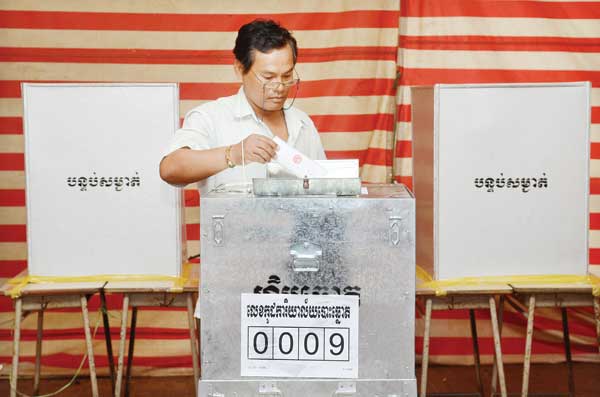
<br /> A man in Phnom Penh casts his vote in nationwide commune elections in June. Photograph: Meng Kimlong/Phnom Penh Post

A man in Phnom Penh casts his vote in nationwide commune elections in June. Photograph: Meng Kimlong/Phnom Penh Post
Dear Editor,
The report by Professor Surya Subedi, the UN special rapporteur on human rights in Cambodia, mentioned in the Post’s cover story yesterday deals largely with Cambodia’s elections. There are serious flaws in that part of the report.
Subedi’s criticisms of Cambodian elections rarely rise above the level of “concerns were raised that . . .” Who raised these concerns, and whether they were valid, is apparently beneath his notice.
Highly illuminating in that regard are these words: “Expressing frustration with the electoral process, a Cambodian citizen wrote in an individual petition to the Special Rapporteur that, if the current state of affairs continued, the ruling party would win elections forever and there was no hope for other political parties.”
That’s right: one citizen wrote complaining, not of specific wrongdoing, but that he or she didn’t like past, or likely future, election outcomes.
This sole complaint about nothing in particular is the only “evidence” for the assertion that many Cambodians are somehow “effectively disenfranchised”.
The title “Conclusions” implies Subedi is summing up, or pointing out the logical consequences of, evidence considered in the previous section.
But the “Conclusions” either raise new points, most of them platitudes that could have been written without their author ever having visited Cambodia, or are in conflict with other parts of the report.
Paragraph 63, for example, says the electoral laws need to “be compatible with international standards”. Subedi must have forgotten that in Paragraph 49, he said the laws were already compatible with international standards.
The “Recommendations” are 18 paragraphs long. Two or three of them may be desirable, and no doubt the government will consider whether their benefits outweigh their cost.
Most of them are impractical, unnecessary and/or counter-productive.
For example, Subedi writes: “The National Electoral Committee should appoint professional election administrators to replace village chiefs during voter registration and on election day.”
There are 13,000 villages in Cambodia. How many professional election administrators are there in the country? Are there any?
Equally unrealistic is Sunedi’s proposal to create “a special election tribunal or election court . . . to resolve election-related disputes”.
Cambodia is already stretched to provide competent, experienced judges for its courts. Creating new courts would exacerbate this problem and would not reduce complaints by the opposition, which would view the judges as tools of the government.
On voter registration, Subedi seems to be unfamiliar with the procedure. He says the voter list should be “available to candidates from all political parties upon request”.
In the real Cambodia, voter lists are posted publicly at commune offices months before the election, and citizens are encouraged to check that their name is entered correctly and to record the number next to their name, which makes voting quicker on election day.
This posting of the voting list would also seem to make pointless Subedi’s call for a totally new electoral roll. If anyone thinks names have been wrongly included, they can point to them on the list.
Subedi calls for “consensus” among the parties in parliament for the appointment of the National Electional Commission and provincial election committees (PECs).
“Consensus” means agreement. Subedi’s proposal means every party with a member in the National Assembly would have a de facto veto on appointments to the NEC and PECs. As well as being anti-democratic, such a provision would probably mean the NEC and PECs could never be formed.
Also absurd is the proposal that every election body should have “balanced representation of all political parties with representation in the National Assembly”.
In this context, it’s hard to see how “balanced” can mean anything other than one of two things: “equal” (each of the five parties having the same number of representatives on election bodies); or “proportional” (the number of representatives of each party corresponding to their relative number of seats in the National Assembly).
Equal representation in the NEC would mean one (or two) representatives from each of the five parties.
The appointees of the four smallest parties (or just three of the four) could then impose regulations and rulings favouring themselves.
In fact, parties that together won only seven of the 123 National Assembly seats could take control of the NEC and PECs, and thus of the election itself.
Or, if “balanced” means “proportional”, the proposal becomes completely impractical and would make the NEC and PECs unwieldy.
“All major political parties should have fair and equal access to the mass media to convey their messages to the electorate.” Paragraph 70 illustrates well how Subedi relies on nice-sounding phrases without bothering to define anything precisely or investigate the implications.
How, for example, is the government to ensure mass-media access is both fair and equal? Fairness and equality are often in conflict with each other.
If party A has a million members and party B has 20 members, would it be fair for the mass media to give them equal access?
Requiring either fair or equal access for all political parties to “the mass media” would be impossible: imagine the hordes of enforcers demanding that a royalist newspaper give equal space to a republican party, or demanding that signboards outside the CPP and SRP headquarters include the logos of the other parties.
Allen Myers
Phnom Penh
Send letters to: [email protected]
The views expressed above are solely the author’s and do not reflect any positions taken by The Phnom Penh Post.
Contact PhnomPenh Post for full article
Post Media Co LtdThe Elements Condominium, Level 7
Hun Sen Boulevard
Phum Tuol Roka III
Sangkat Chak Angre Krom, Khan Meanchey
12353 Phnom Penh
Cambodia
Telegram: 092 555 741
Email: [email protected]










